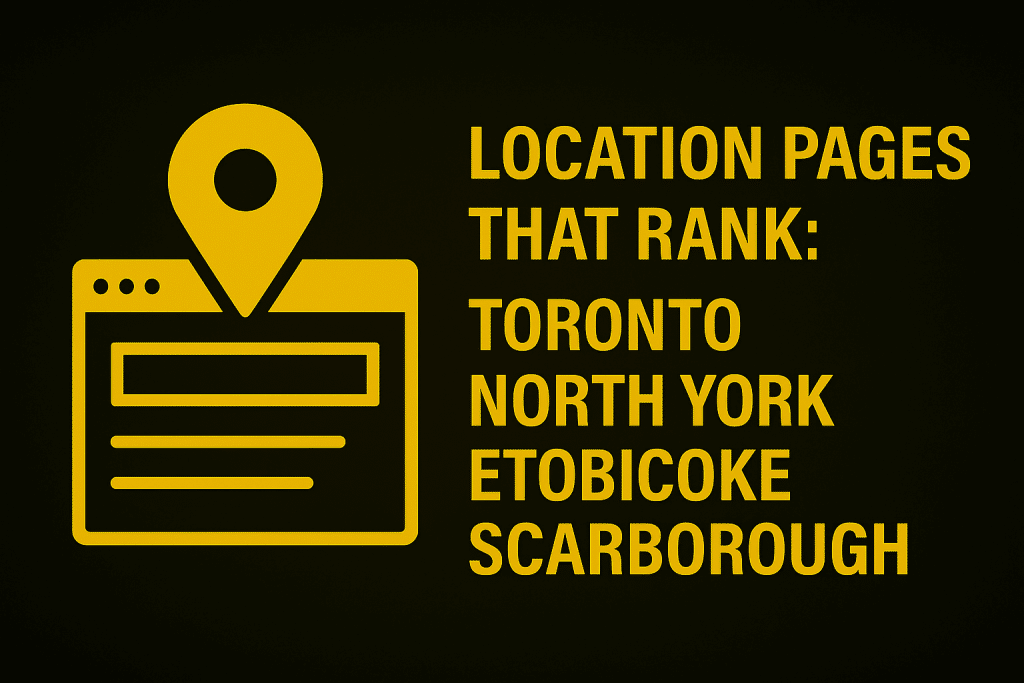In today’s hyper-competitive digital market, ranking location-specific pages is one of the most effective ways to dominate local SEO. Businesses that operate across multiple neighborhoods in the Greater Toronto Area (GTA) — including Toronto, North York, Etobicoke, and Scarborough — need dedicated location pages that capture search intent, drive leads, and convert customers. A well-structured location page strategy can set you apart from competitors and ensure you appear in local search results and Google Maps.
This guide provides a comprehensive breakdown of how to build, optimize, and scale location pages that actually rank in Toronto and its key districts.
Why Location Pages Matter in Toronto SEO
Toronto is one of the most competitive digital markets in North America. With thousands of businesses competing for visibility, generic pages simply don’t cut it. Location pages allow your business to target specific neighborhoods, showcase localized expertise, and connect directly with searchers in their area.
For example, a page designed for “SEO in North York” targets not just general Toronto searchers but businesses and residents specifically looking for solutions in North York. These hyper-focused pages increase relevance and improve your odds of appearing in Google’s local 3-pack, the highly visible map results that dominate local searches.
Core Elements of High-Performing Location Pages
1. Geo-Optimized Keyword Targeting
Each location page should be optimized with geo-specific keywords such as:
“SEO company in North York”
“Etobicoke SEO services”
“Scarborough local marketing agency”
Instead of duplicating generic text across pages, create unique, neighborhood-tailored content that addresses local needs.
2. Localized Content Depth
Google rewards in-depth, unique content. On your Scarborough page, highlight Scarborough-specific industries or case studies. On your Etobicoke page, emphasize small business growth in that district. Tailoring content ensures authenticity and prevents thin content penalties.
3. NAP Consistency
Ensure your Name, Address, and Phone Number (NAP) details are consistent across your location pages, Google Business Profile, and citation directories. Inconsistencies can damage local rankings. For Toronto businesses, citation building remains vital, as explained in Why Citation Building Still Matters for Toronto Local Rankings in 2025.
4. Maps & Driving Directions
Embedding a Google Map and providing neighborhood-specific driving directions not only improves user experience but signals to search engines that your business is truly tied to that location.
5. Schema Markup
Use LocalBusiness schema to structure your data. This enhances visibility in rich results and ensures Google understands your business’s geographic focus.
Building Pages That Rank in Toronto’s Key Districts
Toronto Location Page Strategy
Toronto is the core hub. Your Toronto page should act as a flagship, covering a wide range of industries, testimonials, and case studies. Include competitive differentiators and connect it to other neighborhood pages for internal linking.
Relevant resource: Top SEO Agencies in Toronto Are Using AI to Outrank the Competition.
North York Location Page Strategy
North York has a unique business ecosystem with professional services, startups, and immigrant-owned businesses. Content should highlight:
Affordable SEO for small businesses.
Local success stories (e.g., law firms, healthcare clinics).
Industry-specific search trends in North York.
Pro Tip: Add FAQ sections targeting common searches such as “best SEO in North York for small businesses.”

Etobicoke Location Page Strategy
Etobicoke is home to logistics companies, real estate firms, and established retailers. Your location page should emphasize:
Case studies of local companies.
Service offerings tailored for industries that dominate Etobicoke.
Insights on ROI, referencing resources like SEO vs Google Ads in Toronto.
Scarborough Location Page Strategy
Scarborough has a growing population and diverse small business scene. Highlight:
Local visibility for multicultural businesses.
Affordable SEO campaigns with measurable results.
Community connections and local reviews.
Building credibility here often involves multilingual content strategies, making Scarborough a great place to showcase adaptability.
Internal Linking to Boost Authority
Internal linking passes authority between your pages and improves crawlability. For example:
From your Toronto location page, link to: What Makes a Great Toronto SEO Company.
On the North York page, link to Toronto Local SEO: Why Your Business Isn’t Showing Up on Google Maps.
On Etobicoke, reference Content Optimization: Boosting Engagement and Rankings.
For Scarborough, include a resource like Local SEO Tips for Toronto Businesses: Rank in the Google 3-Pack.
End every location page with a Call-to-Action linking to Contact Us.
This strategy not only keeps visitors on your site longer but also improves topical authority for Google.
External Authority Links
Google rewards content that references authoritative sources. Two recommended external references:
Government of Canada Business Registration — useful for companies expanding across Toronto districts.
Google Business Profile Help — official guide to optimize your GBP for each location.
Adding these links signals trustworthiness and relevance.
Avoiding Common Mistakes with Location Pages
Duplicate Content Across Locations
Copy-pasting the same content with minor keyword changes dilutes SEO. Each page must be uniquely written.Ignoring Mobile Optimization
Toronto searchers often look for local services on mobile. Pages must load fast, pass Core Web Vitals, and be responsive.Lack of Conversion Elements
Pages should include calls-to-action, testimonials, and trust badges. Without these, rankings may not translate into conversions.
Advanced SEO Tactics for Location Pages
AI-Powered Keyword Research: Use tools like SEMrush or Ahrefs to uncover long-tail neighborhood keywords. See insights in Toronto Keyword Research: Intent-First Strategy.
Content Silos: Build supporting blog posts for each neighborhood page and interlink them. Reference: Content Silos for Toronto Niches.
Backlink Acquisition: Build backlinks from local news outlets, community boards, and associations in each district.
Final Thoughts: Winning Toronto Local SEO with Location Pages
Creating effective location pages for Toronto, North York, Etobicoke, and Scarborough requires a balance of local relevance, technical SEO, and conversion-focused content. When structured correctly, these pages not only rank but also generate qualified leads.
If your business wants to dominate across the GTA, now is the time to invest in a scalable location page strategy.
👉 Ready to elevate your local presence? Contact Us today and discover how tailored SEO strategies can put your business ahead of the competition.


